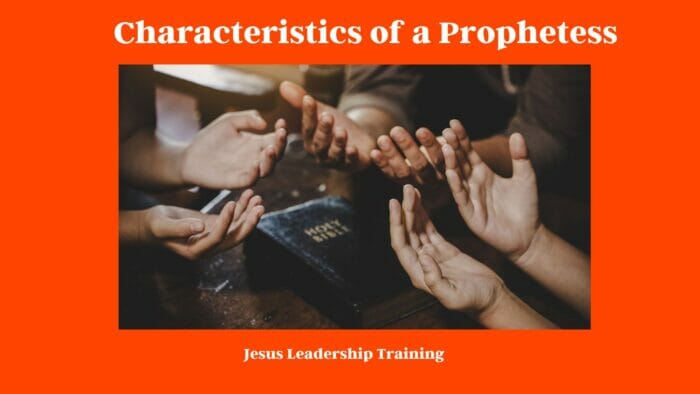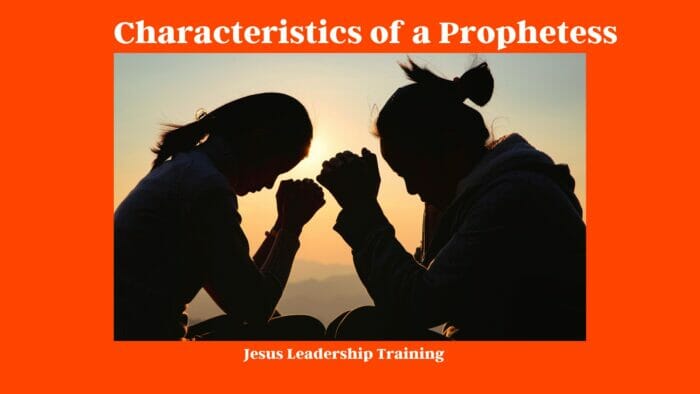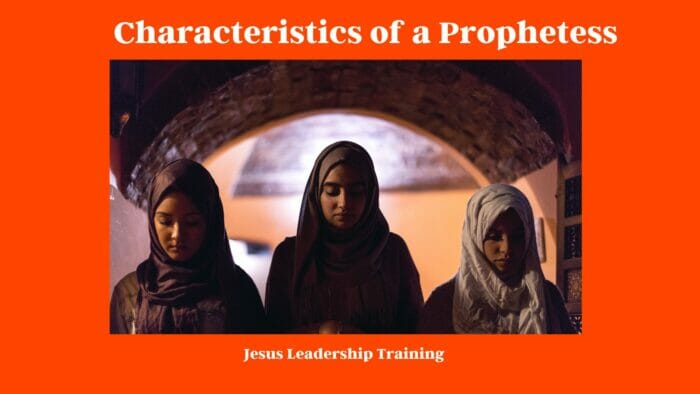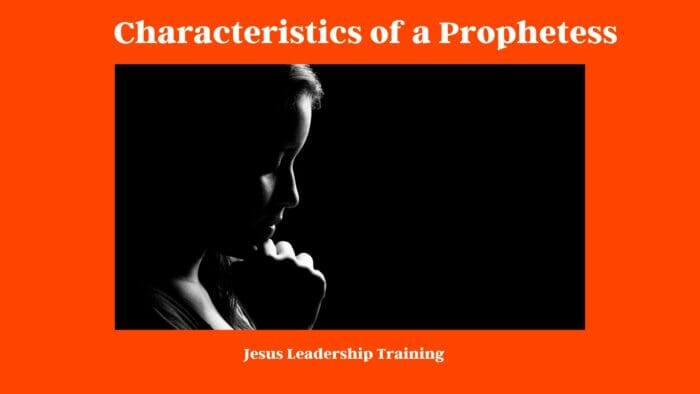Characteristics of a Prophetess – Prophetesses have long been enigmatic figures in religious, cultural, and historical contexts. These spiritually gifted women have captured the imagination of many, with their extraordinary abilities to foresee the future and relay divine messages
Table of Contents
10 Characteristics of a Prophetess
In this article, we will delve into the fascinating world of prophetesses and explore the defining characteristics that set them apart. We will also discuss their roles in various religious and historical contexts and address some frequently asked questions about these enigmatic women. So, hold onto your hats as we embark on a journey to unravel the mystique surrounding the characteristics of a prophetess.
- Divine Inspiration: A prophetess is one who has been chosen by God to receive divine inspiration. This inspiration can come in various forms, such as visions, dreams, prophecy, and revelation. The prophetess is divinely inspired to speak God’s truth and to call people to obedience and repentance.
- Authority: A prophetess is someone who has been appointed by God to speak on His behalf. The prophetess is given divine authority to speak the words of God to His people.
- Power to Speak God’s Word: The prophetess is empowered by God to speak His word with power. This power is often manifested in the form of miracles, signs, and wonders.
- Supernatural Guidance: A prophetess is divinely guided in her proclamation of God’s word. This guidance may come in the form of prophetic dreams, visions, and revelations.
- Anointing: A prophetess is anointed by God to speak on His behalf. This anointing is a sign of God’s favor and sets the prophetess apart as His messenger.
- Righteousness: A prophetess is called to lead a life of holiness and righteousness. This includes living a life that is pleasing to God and in accordance with His will.
- Self-Sacrifice: A prophetess is called to sacrifice her own desires and interests in order to fulfill the will of God. The prophetess must be willing to give up her own wants and desires in order to fulfill her calling.
- Boldness: A prophetess must be bold in speaking the truth of God. This requires courage in the face of opposition and criticism.
- Humility: A prophetess must be humble in her service to God. She must be willing to submit her will to God’s will and to accept correction from Him.
- Commitment: A prophetess must be committed to her calling and to the work of the Lord. This requires a dedication and loyalty to God’s word and to His people.

Etymology of the Biblical Word Prophetess
The word ‘Prophetess’ is mentioned in the Bible and has its origins in the ancient languages of Hebrew, Greek, and Aramaic. The word prophetess is used to refer to a female prophet or seer – someone who is able to receive divine revelations and prophecies. In this blog, we will explore the etymology of the word Prophetess and how it has evolved over time.
Origin
The origin of the word ‘Prophetess’ comes from the Greek word ‘prophētēs’. This term was used to refer to a person who spoke on behalf of the gods or goddesses and delivered messages from them. This term was then adopted into the Hebrew language as ‘navi’, which was used to refer to a messenger of God. In Aramaic, the term ‘nabiyya’ was used to refer to a female prophet or seer.
Hebrew
In the Hebrew Bible, the word ‘navi’ is used to refer to a male prophet or seer. However, the word ‘prophetess’ is used to refer to a female prophet or seer. It is derived from the Hebrew word ‘neviah’, which means ‘to prophesy’. In the Hebrew Bible, the Prophetess Miriam is the first female prophetess mentioned.
Greek
In the Greek language, the word ‘prophētēs’ is used to refer to a male prophet or seer. However, the word ‘prophetissa’ is used to refer to a female prophet or seer. It is derived from the Greek word ‘prophētēs’, which means ‘to speak forth’. In the Greek New Testament, the Prophetess Anna is the first female prophetess mentioned.
Aramaic
In the Aramaic language, the word ‘nabiyya’ is used to refer to a female prophet or seer. It is derived from the Aramaic word ‘nabiyyun’, which means ‘to speak out’. In the Aramaic Bible, the Prophetess Huldah is the first female prophetess mentioned.
Overall, the word Prophetess has its origins in the ancient languages of Hebrew, Greek, and Aramaic. It is used to refer to a female prophet or seer – someone who is able to receive divine revelations and prophecies. The word has evolved over time, but its meaning remains the same.
The concept of a prophet has been around for millennia, and in many cultures, the idea of a female prophetess is not a new one. From Biblical times to present day, the role of a prophetess has been both mysterious and compelling. But what exactly is a prophetess, and how do they differ from male prophets? In this blog post, we will explore the enigmatic aura of a prophetess and unravel the characteristics of this sacred role.

Understanding the Characteristics of a Prophetess
At its core, a prophetess is a female messenger of God, chosen by God to receive and communicate divine messages and teachings to the people. In the Bible, the term prophetess is used to refer to both female prophets and prophetesses. However, the term prophetess is often used to refer to a woman who is gifted with a special ability to receive and interpret divine messages. This can include visions, prophetic dreams, miracles, or other divine manifestations. Prophetesses are generally chosen by God and are often seen as spiritual leaders in their respective communities.
A prophetess is a female messenger of God, who is tasked with delivering God’s message to the people. A true prophetess is guided by the wisdom of God and is able to discern with clarity and insight the will of God for the people. The prophetess is able to interpret the Word of God, interpret the signs of the times, and is able to speak with authority and power.
The prophetess is called to be a witness to God’s judgment upon the people and to be a messenger who brings God’s word to the people. She is a voice that speaks out against injustice and speaks out for righteousness. A prophetess is a person that is able to proclaim God’s word and message to the people and to proclaim God’s judgment.
The prophetess is a leader among God’s people and is called to lead the people in worship and in obedience to God’s commandments. She is called to speak out against sin and call people to repentance. A prophetess is a person who stands in the gap between God and His people and speaks the truth in love. She is a witness to God’s mercy and grace and to His judgment. A prophetess is a person who speaks for God to the people, and who speaks for the people to God.
How Women Differ from Men in Prophethood
The differences between male and female prophets are often subtle but significant. While both male and female prophets are chosen by God, female prophets are usually more in tune with the spiritual realm and are often more compassionate and nurturing in their approach. Women are more likely to be seen as messengers of peace, love, and healing, whereas men are more likely to be seen as messengers of judgment, wrath, and destruction.

Differentiating Between a True Prophet and False Prophet
Like all prophets, a true prophetess is chosen by God to receive and communicate divine messages. A false prophetess is someone who claims to be a prophetess but is not chosen by God. False prophets may try to lead people astray or manipulate them for their own gain. It is important to differentiate between a true prophetess and a false prophetess so as to avoid being misled or taken advantage of.
Examining Examples of Prophetesses from the Old Testament
The Old Testament is full of examples of powerful female prophets. The most famous of these is Miriam, the sister of Moses and Aaron. Miriam is the first prophetess mentioned in the Bible, and she is credited with leading the Israelites in song and dance after their deliverance from Egypt. Other notable prophetesses from the Old Testament include Deborah, Huldah, and Isaiah’s wife. All of these women were chosen by God to deliver divine messages and to lead their people in faith.
- Miriam: Miriam is one of the most prominent prophetesses in the Bible, known for leading the Israelites in a song of praise after crossing the Red Sea. She is also the sister of Moses and Aaron and was a prophetess in her own right. She is famously known for her bravery when she stood up to Pharaoh on behalf of her people.
- Deborah: Deborah was a prophetess and judge in the Old Testament. She was a leader in the tribes of Israel and was the only female judge in the period of the Judges. She is credited with leading the people in a successful battle against the Canaanites.
- Huldah: Huldah was a prophetess in the time of King Josiah of Judah. She was consulted by the King’s officials and is credited with delivering several prophetic messages.
- Anna: Anna was a prophetess in the time of Jesus. She is mentioned in the Gospel of Luke and was present in the temple when Mary and Joseph presented Jesus to the Lord. Anna is credited with being a devout worshiper who was filled with the Holy Spirit.
- Noadiah: Noadiah was a prophetess in the time of Nehemiah. She is mentioned in the book of Nehemiah and is described as being a false prophetess who tried to dissuade the people from rebuilding the city wall.
- Isaiah’s wife: Isaiah’s wife is mentioned in the book of Isaiah and is credited with delivering prophetic messages. She is believed to be a prophetess in her own right and is credited with having delivered oracles to the people of Israel.
- Isaiah’s daughter: Isaiah’s daughter is mentioned in the book of Isaiah and is believed to be a prophetess in her own right. She is credited with delivering oracles to the people of Israel.
- Abigail: Abigail was a prophetess in the time of King David. She is credited with delivering a prophetic message to David, warning him of the consequences of his actions.
- Huldah’s daughters: Huldah’s daughters are mentioned in the book of Nehemiah and are credited with being prophetesses in their own right. They are credited with delivering oracles to the people of Israel.
- The four daughters of Philip: The four daughters of Philip are mentioned in the book of Acts and are believed to be prophetesses in their own right. They are credited with delivering prophecies during the early days of the Church.
Examining Examples of Prophetesses from the New Testament
The New Testament also contains several examples of prophetesses. Anna, a righteous widow, is one of the most well-known. She was a prophetess who spent her life in the Temple, prophesying about the coming of the Messiah. The four daughters of Philip the Evangelist are also mentioned in the New Testament as prophetesses. These women were gifted with the Holy Spirit and they preached throughout Asia Minor.
The Role of the Holy Spirit in Prophethood
The Holy Spirit plays an important role in prophecy, both for male and female prophets. The Holy Spirit gives the prophetess the ability to receive and interpret divine messages. The Holy Spirit also gives the prophetess strength and courage to stand up for what is right and to speak truth to power.
Connecting Prophetesses to Jesus Christ
The prophetesses of the Old and New Testaments are all connected to Jesus Christ. In some cases, they prophesied about his coming or spoke of his message of love and forgiveness. In other cases, they were witnesses to his miracles or heard his teaching. All of these prophetesses serve as a reminder that Jesus is the ultimate source of hope and salvation.
Exploring the Relationship Between Prophetesses and God
The relationship between a prophetess and God is unique and powerful. A prophetess is chosen by God to receive and communicate divine messages, and the prophetess has a special bond with God. This bond is based on trust and reverence, and it is a reminder to the prophetess that God is always present and ready to guide and protect.
Analyzing the Characteristics of Prophetesses from an Interfaith Perspective
Prophetesses are a powerful force for good, regardless of faith. As we examine the characteristics of prophetesses from different religious traditions, we find that they share many common qualities. Prophetesses from all faiths are seen as wise and compassionate leaders, and they often serve as spiritual counselors and teachers for their communities.
Assessing the Role of Prophetesses in Contemporary Society
Today, the role of prophetess is still relevant and important. In an increasingly secular world, prophetesses can provide spiritual guidance and comfort to those who are searching for meaning and purpose. Prophetesses can also serve as advocates for justice and peace, and they can help to bridge the gaps between different religious traditions.
In contemporary society, there is a growing interest in the role of prophetesses. Many individuals are intrigued by the work of these spiritual leaders and how they impact their communities. Prophetesses have a long history in different cultures and religions, and they have played crucial roles in shaping the beliefs and practices of their followers. In this article, we will explore the role of prophetesses in contemporary society and how their work continues to shape the world we live in today.
Prophetesses are spiritual leaders who have been called by a higher power to serve as messengers and guides. They are individuals who possess extraordinary spiritual abilities and have the gift of prophecy. Prophetesses can receive divine revelations, visions, and messages from the spirit world, and they use this knowledge to help their followers navigate their lives.
The History of Prophetesses
The history of prophetesses dates back to ancient times. In many cultures, women were revered for their spiritual abilities and were believed to have a special connection to the divine. In Greek mythology, the Pythia was a prophetess who served as an oracle in Delphi. In the Bible, Deborah was a prophetess who played a crucial role in guiding the Israelites. In Africa, prophetesses played important roles in traditional religions, serving as mediums between the living and the dead.
The Role of Prophetesses in Contemporary Society
Today, prophetesses continue to play important roles in different religions and spiritual practices. They serve as guides and mentors, helping individuals connect with their inner selves and find meaning in their lives. Prophetesses also provide spiritual guidance and support to those who seek it, and they can help individuals navigate difficult times in their lives.
Prophetesses also play important roles in promoting social justice and advocating for marginalized communities. Many prophetesses have used their spiritual gifts to raise awareness about social issues and to fight for the rights of oppressed communities. For example, Harriet Tubman was a prophetess who used her spiritual abilities to help slaves escape to freedom through the Underground Railroad.
The Challenges Faced by Prophetesses
Despite the important roles that prophetesses play in contemporary society, they also face many challenges. In some cultures, women are not allowed to hold positions of spiritual leadership, and prophetesses may face discrimination and persecution. Prophetesses may also struggle to balance their spiritual duties with their personal lives and may face criticism from those who do not understand their work.
Examining the Impact of Prophetesses Within Different Religious Traditions
The impact of prophetesses within different religious traditions cannot be overstated. Prophetesses have been a source of inspiration and guidance for centuries, and they continue to play an important role in many faith communities today. From the early days of the Old Testament to the New Testament and beyond, the unique gifts of prophetesses have been a powerful force for good.
The Divine Connection: Key Characteristics of a Prophetess
1. Gift of Prophecy
At the heart of a prophetess’s identity lies the extraordinary gift of prophecy. This innate ability allows them to:
- Receive divine revelations from a higher power
- Foresee significant events or calamities
- Offer guidance and counsel to those who seek their wisdom
While not every prophetic message comes in the form of grand visions or earth-shattering predictions, a prophetess’s words often carry immense weight, shaping the lives and decisions of those who heed their counsel.
2. Spiritual Sensitivity
A prophetess’s heightened spiritual sensitivity enables them to:
- Perceive the presence of spiritual beings or energies
- Discern the intentions of others
- Sense impending danger or spiritual attacks
This uncanny intuition often acts as a beacon of light in dark times, guiding the prophetess and those around her.
3. Unyielding Conviction
A defining characteristic of a prophetess is their unyielding conviction in the face of adversity. They often:
- Stand firm in their beliefs, even when confronted by skeptics or antagonists
- Sacrifice personal comfort for the sake of their divine mission
- Remain steadfast in their commitment to spreading their prophetic message
4. Compassion and Empathy
Empathy and compassion are hallmarks of a prophetess’s demeanor. They are known to:
- Genuinely care for the well-being of others
- Offer a listening ear and comforting words to those in need
- Extend their love and compassion to all, regardless of their background or beliefs
The Prophetess’s Role in Religion and History
Prophetesses have played significant roles in various religious and historical contexts, including:
- Guiding their communities through times of turmoil
- Serving as spiritual leaders and advisors to kings and rulers
- Interceding on behalf of their people before the divine
Some noteworthy prophetesses throughout history include Deborah from the Hebrew Bible, the Oracle of Delphi in ancient Greece, and Hildegard of Bingen, a Christian mystic from the 12th century.
FAQs about Prophetesses
Q: Are all Prophetesses part of a Specific Religion?
A: While some prophetesses may have played prominent roles in specific religious traditions, the gift of prophecy transcends religious boundaries. Prophetesses can be found across cultures and faiths, each serving a unique purpose in their respective contexts.
Q: Are there any Modern-day Prophetesses?
A: Yes, there are individuals who claim to possess the gift of prophecy in contemporary times. However, the authenticity of their prophetic abilities remains a topic of debate, with some asserting that they are genuine spiritual leaders while others dismiss them as charlatans.
Q: Can the gift of Prophecy be Learned or Acquired?
A: The gift of prophecy is generally considered to be a divine endowment that cannot be acquired through training or effort. While some people may develop an increased spiritual sensitivity or intuition through dedicated practice and personal growth, the innate ability to receive divine revelations and foresee the future remains a rare and unique gift bestowed upon a select few.
Q: How have the Roles of Prophetesses Evolved over Time?
A: The roles of prophetesses have evolved in response to changing societal and cultural norms. While they may have once held positions of great influence and authority, modern-day prophetesses often work in more subtle ways, providing spiritual guidance and counsel to those who seek their wisdom. Nevertheless, the core characteristics of a prophetess remain the same, regardless of the era or context in which they operate.
Final Thoughts – Characteristics of a Prophetess
The characteristics of a prophetess are as intriguing as they are awe-inspiring. These spiritually gifted women possess a unique connection to the divine, allowing them to receive prophetic messages and offer guidance to those in need. Their spiritual sensitivity, unyielding conviction, and compassionate nature set them apart from the ordinary, leaving an indelible mark on the lives of those they encounter.
The enigmatic aura of a prophetess is a captivating one, and it is important to understand the role of a prophetess and her characteristics. From the Old Testament to present day, prophetesses have been a source of comfort and guidance to their communities. By exploring the relationship between prophetesses and God, we can better appreciate the impact of this sacred role.
In a world that often struggles to find meaning and direction, the presence of a prophetess serves as a beacon of hope, shining light on the path to a brighter future. Though their roles may have evolved over time, the essence of a prophetess remains an enigma, captivating the hearts and minds of those who seek to understand the mysteries of the spiritual realm.




